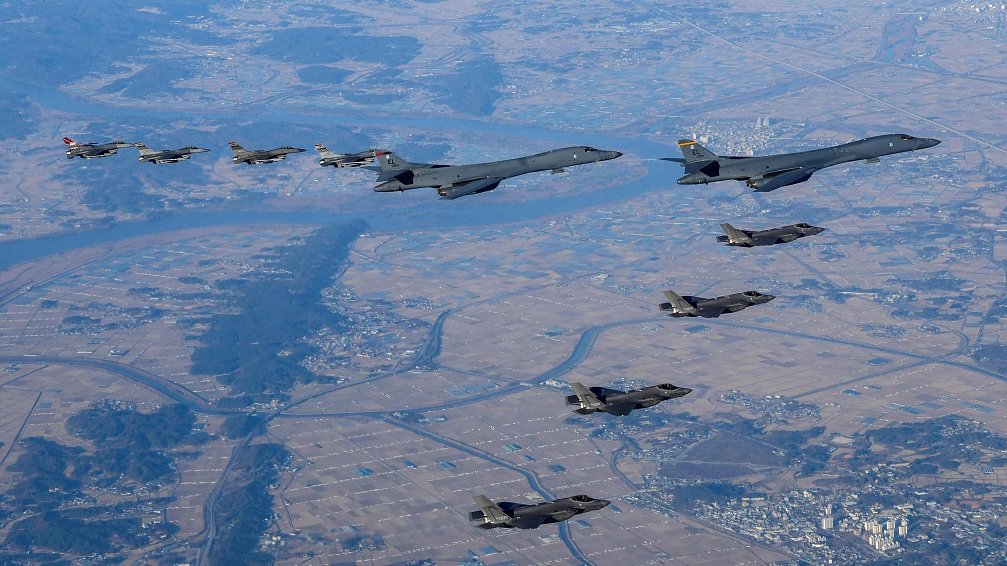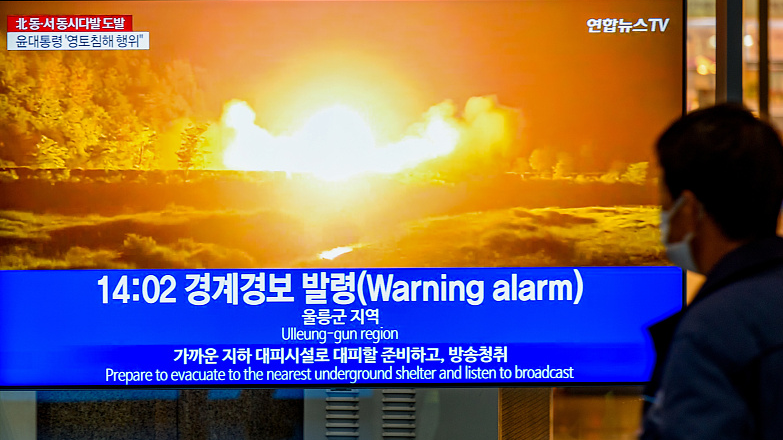
Two U.S. Air Force B-1B heavy bombers (C), four Air Force F-35 fighter jets from the Republic of Korea (ROK) and four U.S. Air Force F-16 fighter jets are flying over the ROK during a joint air drill in the ROK, November 5, 2022. /CFP
Two U.S. Air Force B-1B heavy bombers (C), four Air Force F-35 fighter jets from the Republic of Korea (ROK) and four U.S. Air Force F-16 fighter jets are flying over the ROK during a joint air drill in the ROK, November 5, 2022. /CFP
Editor's note: Gabriela Bernal is a Korean analyst and a PhD student at the University of North Korean Studies in Seoul, Republic of Korea. The article reflects the author's opinions, and not necessarily the views of CGTN.
On December 7, U.S. National Security Council (NSC) coordinator for strategic communications John Kirby announced that the U.S. plans on continuing to hold joint military exercises bilaterally and trilaterally with the Republic of Korea (ROK) and Japan. The goal of such drills are aimed at deterring the Democratic People's Republic of Korea (DPRK) and showing a strong, united stance against military action conducted by Pyongyang. In reality, however such repeated exercises do nothing but aggravate an already tense and dangerous situation on the Korean Peninsula.
U.S. military forces have already conducted a long series of military exercises this year, involving both the ROK and Japan. These drills, the latest having started in September, have elicited a strong response from the DPRK, which proceeded with a months-long campaign of missile testing, artillery firing, and other actions to demonstrate its displeasure at Washington and Seoul's actions. The situation quickly escalated into unproductive and dangerous tit-for-tat of military provocations and even led to missiles landing north and south of the Northern Limit Line (NLL, maritime border between the two Koreas) for the first time ever.
Although all-out confrontation was avoided last time, things may not turn out the same way if tensions escalate to dangerous levels yet again. While the DPRK, according to reports, has yet to conduct a seventh nuclear test, both the U.S. and the ROK maintain a hardline posture with regards to their policy on the DPRK. The announcement on Wednesday is the latest example of this.
"You have seen more bilateral exercises between us and our allies. You have seen trilateral exercises, trilateral coordination. All that's going to continue," Kirby said on Wednesday. Kirby also called on China to put more pressure on the DPRK, saying Beijing has "shown no desire to really put the kind of pressure on Pyongyang that we know they could put."
That statement is problematic for multiple reasons. First of all, the DPRK is its own country that makes their own decisions and China can't force Pyongyang to act in any particular way. Secondly, is more "pressure" really the answer? The U.S. has been putting pressure on the DPRK for years but has very little, if anything, to show for it. No good has come from this approach. Asking Beijing to join this failing strategy is counterintuitive.

A TV news report on the Democratic People's Republic of Korea's missile launch from Ulleungdo island, at a railway station in Seoul, the ROK, November 2, 2022. /CFP
A TV news report on the Democratic People's Republic of Korea's missile launch from Ulleungdo island, at a railway station in Seoul, the ROK, November 2, 2022. /CFP
Take sanctions, for example. Over a decade of sanctions may have hurt the DPRK's economy, but the ultimate goal – getting the DPRK to give up its nuclear weapons program – has failed. Even DPRK leader Kim Jong-un said in September that another 100 years of sanctions would make no difference.
Still, Kirby made sure to mention Washington's ongoing willingness to "sit down without preconditions with Kim Jong-un to try to find the diplomatic path forward." This kind of mixed messaging is not the way to build trust with the DPRK. Pyongyang will never be interested in serious talks with Washington as long as the latter's actions don't match up with their words.
Besides the U.S., the approach to the DPRK by the ROK is also not heading in the right direction. The ROK's President Yoon Suk-yeol said on Wednesday that his country must "perfectly overwhelm" DPRK in conventional military strength. He also urged his military officials to "trust in the overwhelming nuclear power of our ally nation," referring to the U.S.
The U.S. and its allies have the choice to not respond to every military "provocation" from the DPRK and to not unnecessarily continue repeating military drills that should have ended months ago. While this may seem like a sign of weakness to them, in reality, it is a sign of strength and responsibility. While the actions of the DPRK cannot be controlled, the actions of one's own country and military can be. Here in lies the key to easing tensions and avoiding a potential conflict that could harm not just the region, but the entire world.
(If you want to contribute and have specific expertise, please contact us at opinions@cgtn.com. Follow @thouse_opinions on Twitter to discover the latest commentaries on CGTN Opinion Section.)